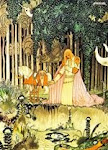"Surely the primary, survival-effective uses of language involve stating alternatives and hypotheses. We don't, we never did, go about making statements of fact to other people, or in our internal discourse with ourselves. We talk about what may be, or what we'd like to do, or what you ought to do, or what might have happened... a continual weaving and restructuring of the remembered and the perceived and the imagined, including a great deal of wishful thinking and a variable quantity of deliberate or non-deliberate fictionalizing, to reassure ourselves or for the pleasure of it..."
"Fiction in particular, narration in general, may be seen not as a disguise or a falsification of what is given but as an active encounter with the environment by means of posing options and alternatives, and an enlargement of present reality by connecting it to the unverifiable past and the unpredictable future... Fiction connects possibilities, using the aesthetic sense of time's directionality defined by Aristotle as plot; and by doing so it is useful to us... Only the imagination can get us out of the bind of the eternal present, inventing or hypothesizing or pretending or discovering a way that reason can then follow into the infinity of options, a clue through the labyrinths of choice, a golden string, the story, leading us to the freedom that is properly human, the freedom open to those whose minds can accept unreality."
~ Ursula K. Le Guin, from Some Thoughts on Narrative, published in her essay collection: Dancing at the Edge of the World: Thoughts on Words, Women, Places (Grove Press, c1989)
Sunday, August 23, 2009
Thoughts From a Master: Ursula K. Le Guin
Subscribe to:
Post Comments (Atom)


No comments:
Post a Comment